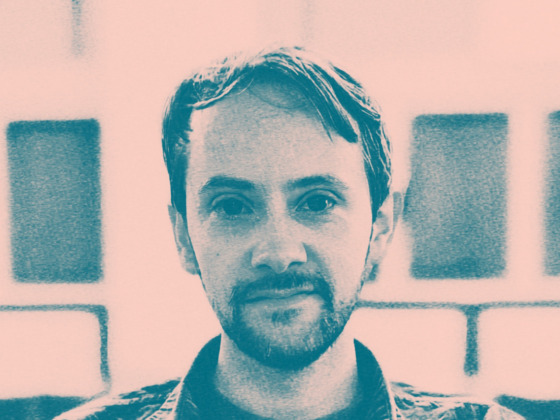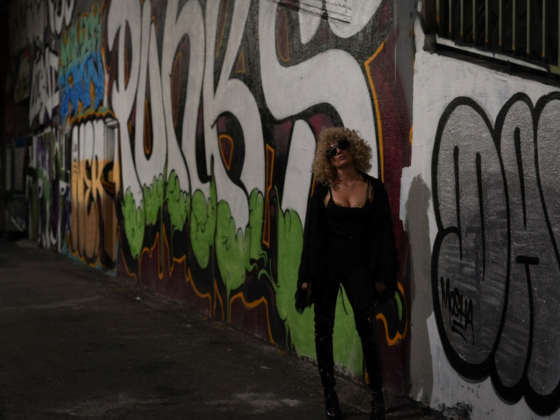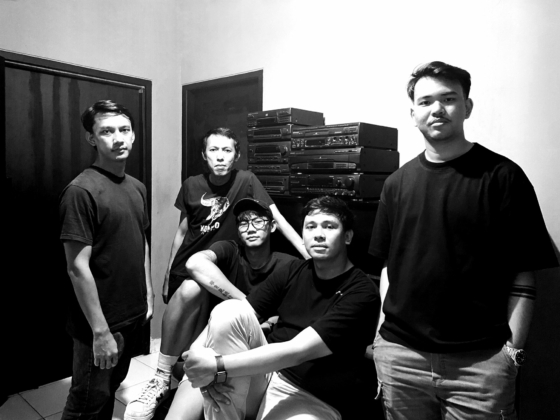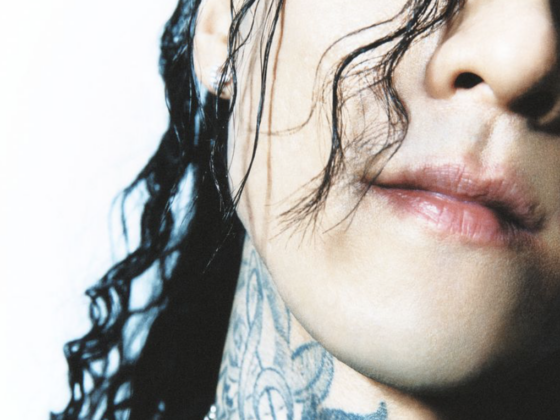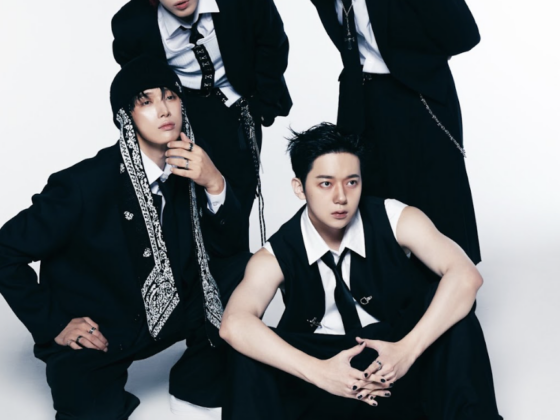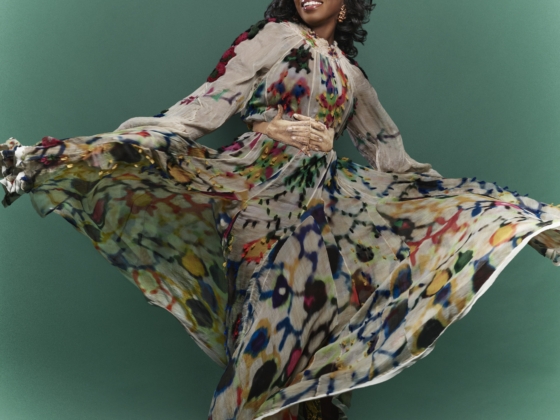There are extraordinary talents that few possess in the realm of creativity. Whether artistic merit, a way with words, a keen imagination, or power behind production, some individuals seem to blossom in any medium.
Simon Green, commonly known as Bonobo, is one evident example. His music has been described as sounds without genres and timeless to all demographics. I had the opportunity to converse with Green about his upcoming release and how exactly this musical mastermind makes sense of the creation process.
EARMILK: Hey Simon, first and foremost thanks for speaking with me today. To start, what was your motivation for creating your first live album?
Simon Green: Well I wanted to document my last tour. We had enough variation with this tour that we could record the trip as a punctionuation. We started out with the idea to make some kind of final document. The live album is only part of this release, there's the DVD documentary, books, and everything else.
[soundcloud url="https://api.soundcloud.com/tracks/166952600" params="color=ff5500&auto_play=false&hide_related=false&show_comments=true&show_user=true&show_reposts=false" width="100%" height="166" iframe="true" /]
EM: Oh, I actually didn't know it was coming as a package. So what do you think is uniquely offered then as opposed to someone just hearing The North Borders? Can you go more in depth as to what this package will include?
SG: I'm more focused on this being a film as a live documentary. I can say that the live album is almost a compliment to the main thing which is the DVD. We shot this across 180 shows, but most of the footage is from a 2000 year old amphitheatre in Croatia. Also some in London, LA, and several radio sessions.
EM: So the video shows a variety of different performances?
SG: Well it's mainly focused on two shows: one in Croatia of an open theatre amphitheatre and one from London Roundhouse. There is also interviews, documentation, and just tour footage. We had this big crew on the tour bus for a whole week on the West Coast, so that's all on there. It's suppose to be a visual idea of what happened on the North Borders Tour.
[youtube]https://www.youtube.com/watch?v=_qnAowOProU&feature=youtu.be[/youtube]
EM: It seems you're always on the road with your last tour having 175 shows in 30 countries. Do you feel you've grown accustomed to this life style or are there still ways you keep meditated while travelling?
SG: I've given up my apartment now so I'm technically homeless. I'm just on the tour bus in Boston at the moment and this is kind of home for now. When I'm on not on tour I'm usually just lingering in whatever city I've ended up in, until the next thing happens.
SG: The main thing that keeps it together is just having good people around. Especially when I bring people in, like the musicians for this tour. It's important to make sure everybody is super cool because you're only on stage for two hours a night, but it's the other 22 hours of the day that matters. It feels like we've been on this long continuous summer vacation with your friends. A never ending holiday.
EM: Yeah definitely. So how did you travel around while you were on The North Borders tour?
SG: Everything. We'd spend like six weeks in the USA touring on the bus bouncing around. Then the band will go home, while I'll continue DJ'ing, flying around every day. Then the band will reconvene in Europe and we're back on the bus for a month. If were in Russia or the Ukraine, we'll just be flying in with 35 flight cases, doing the show, and then flying out again.
SG: We went from Saint Petersburg to Moscow on a night train. We finished a show in Saint Petersburg then loaded all of our cases onto the train and were in sleeper bunks on the train. We flew out of Moscow and went to Ukraine and then got robbed in Ukraine. It's been a never ending adventure.
[soundcloud url="https://api.soundcloud.com/tracks/132999269" params="color=ff5500&auto_play=false&hide_related=false&show_comments=true&show_user=true&show_reposts=false" width="100%" height="166" iframe="true" /]
EM: After finishing the North Borders Tour throughout North America and Europe, you've engaged on a DJ Tour. I actually just caught you in Montreal this Sunday at SAT, which was an amazing show.
SG: Oh no way, for Sunday night that was a really good vibe. I love Montreal, there is a strong connection with the crowd. There used to be a Ninja Tune office based there back in the day, so it's always felt like a second home. Tours always start and end there. I've spent a lot of time in Montreal, it's one of my favourite cities in the world.
EM: Wow! So what do you most enjoy about playing intimate DJ sets without the full live performance behind your music?
SG: DJ'ing is kind of my default really, it's where I come from. The live show is a relatively new thing, it's a only a recent idea to put this live context around my music. To me DJ'ing is coming home, it's where I'm most comfortable.
[soundcloud url="https://api.soundcloud.com/tracks/134605871" params="color=ff5500&auto_play=false&hide_related=false&show_comments=true&show_user=true&show_reposts=false" width="100%" height="166" iframe="true" /]
SG: For this tour though, I wanted to put more of an emphasis on my own music. I did a lot of reedits and it's roughly 70 percent my own sound in various edited and remixed forms. I've been DJ'ing for 15 years, but this tour feels like I'm doing something different. It feels like an actual show rather than DJ'ing in the club. It's different, but It's exciting to me since it feels like a reward for doing two years live touring, which is logistically a lot more hassle. Now I just set up and go.
EM: I've seen you play twice now with the band and I've noticed that you play a lot of your classic songs. When you played Montreal Jazz Festival, you closed with "The Keeper", you'll often perform the big hits that are very instrumental. Yet when you DJ, do you usually play more of a broader range of music that is more experimental?
SG: Oh absolutely, I mean there is stuff I can't DJ. When you're playing live you can play tracks like "Stay The Same" and "The Keeper" because you have the vocalist there and it makes sense. You can't DJ those tunes, they're not dance floor tunes. That's the difference.
SG: It's the other half of my discography that I can DJ. I can't play any of those tunes in the live show because they're just not going to work with the band. I get to play a lot of new material as well, I've been playing half of the new record on this tour, that you'll not going to hear with the live band because it's stuff I'm working on. The band doesn't even hear it until the record is finished, they hear it when everyone else does.
EM: Would you say you keep this division in mind when you produce new music?
SG: No, I don't really think about it when I produce music. I don't allow the options of whether this will be performed live or not. I just make the record I want to make and then figure out whether it will work live.
SG: On previous occasions though I've been playing 120 bpm, four floor house music and the room will be great, everyone is vibing out. But there will be this one kid in the front row who is looking all disappointed and he'll shout, "Play Black Sands, play supper mellow tunes you made 15 years ago". I'll just think, you've never been to a nightclub before have you. Do you know what would happen if I played that? The party would be over [laughs].
SG: It's straddling the idea that not all people who come to my DJ shows are perhaps not dancers. They are the ones who come out to hear the record.
EM: For each show during your DJ sets, do you autonomously pick music that you think will work well or do you already have a theme in mind depending on a city or crowd?
SG: Exactly, it definitely depends on the city and crowd. The more I trust a city the more progressive and deeper I'll go, where as if it's a crowd I think it's not up for new music I'll just stick to a safer playlist.
SG: Places like Chicago, Montreal, the West Coast, I'll go a little weirder. There were points in my set in Montreal where I was playing straight techno and people really got that. You can't do that in certain places because people think, "this isn't Black Sands, I don't know what this is." You have to judge the crowd to see how to see how far you can push them before it get weird. I always like to find that line and take the crowd a little bit over it.
[youtube]https://www.youtube.com/watch?v=5PUIOe3gg5o[/youtube]
EM: I want to turn this interview towards how you make music. You've said that the creative process is very therapeutic for you and you often wear headphones while in production. Does this intimate method pose any limitations?
SG: I wear headphones sometimes but the majority of my producing is on actual monitors in a room with loud speakers. I'm never creating anything start to finish on headphones. Although I have been using headphones lately because I don't have access to studios. My music making operation is a backpack with a laptop in it. But it's been good, I've made this new EP on the road with headphones. I like it, it's a good limitation to have.
EM: A new EP? Is that coming sometime this year?
SG: Yeah, It's coming out in about a month or so. I've been playing the whole EP on this DJ tour.
[soundcloud url="https://api.soundcloud.com/tracks/79914281" params="color=ff5500&auto_play=false&hide_related=false&show_comments=true&show_user=true&show_reposts=false" width="100%" height="166" iframe="true" /]
EM: You've gathered sound recordings from escalators in Hong Kong to old washing machines, and practically anything out of the ordinary. Do you consciously keep an ear out at all times for abstract rhythms and peculiar sounds to sample?
SG: Yeah totally! I've always got this little recorder in my pocket. I spent the day yesterday cycling around Boston with this idea to collect all the sounds from a day. It started off with this street drummer playing on paint cans. Then there were these two dudes playing saxophone on a bridge and this crazy woman on the street barking. So I'm going to gather all of this stuff and put something together as an exercise.
EM: What draws your attention to these sounds? Is it something you notice audibly or visually?
SG: There is rhythm and melody in everything, you just have to find it. There is notes, lines, and patterns everywhere, so if you can put that in some context and make order from it, it can be more rewarding than what is presented to you on a key board, preset, or drum machine. It's more interesting to find these sounds yourself and do the extra work.
EM: You've also experimented with micro-sampling, which seems an extremely tedious task. What do you feel makes this method authentic as opposed to using pre-recorded samples or loops?
SG: Where is the joy in that? There is no fun in making music with sample packs and things that are already there for you to second guess what to do with them. There is no reward there because that is half the job done for you, you're just building out of materials and assembling pre existing ideas. The goal is to pull sound out of the world and make it into something.
EM: Do you think your signature style of music and melodic sounds will ever evolve into a new sound?
SG: I think I'm always growing, it changes from album to album. My taste has evolved a little further as it goes along. I don't want to keep doing the same thing, I'm always interested in doing something I've not done before.
EM: In our last interview, you told me that the music you're making is a reflection of what you like at the time.
SG: Yeah, exactly. That still stands.
EM: Lastly, what type of milk do you usually drink?
SG: Just regular, but I usually go for 2% now. If you're going to make a good coffee though you have to use real milk.
EM: Awesome Simon, thanks once again to take the time to speak with me. Good luck on the rest of your tour!
You can see all Bonobo's upcoming tour dates below as he continues his endeavours into the endless summertime he experiences while on the road.




